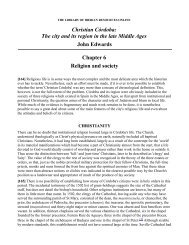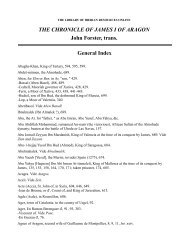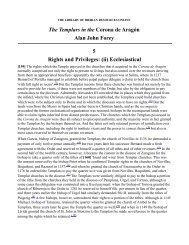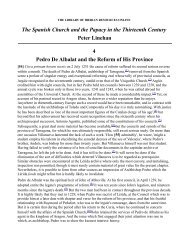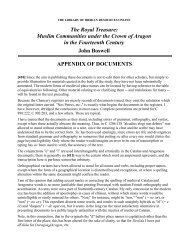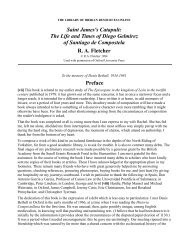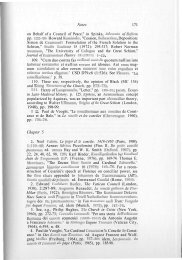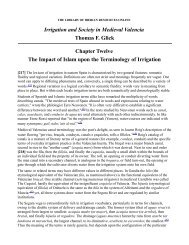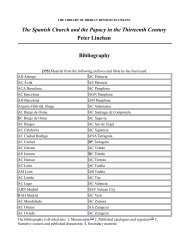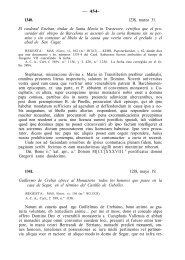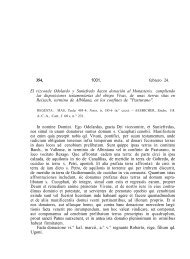PROTESTANTISM - The Library of Iberian Resources Online
PROTESTANTISM - The Library of Iberian Resources Online
PROTESTANTISM - The Library of Iberian Resources Online
You also want an ePaper? Increase the reach of your titles
YUMPU automatically turns print PDFs into web optimized ePapers that Google loves.
ut six sueldos in his house. Fortunately for him, the inquisitors were not unreasonable and, on January<br />
29th, he was allowed to return to his family, but the case remained on the records to be brought up<br />
against him should any malevolent neighbor see fit to distort some careless utterance. (11)<br />
Mysticism and illuminism, which, about this time, commenced their development in Spain, furnished<br />
another source <strong>of</strong> accusations <strong>of</strong> Lutheranism, due to their common tendency to cast aside the<br />
observances <strong>of</strong> sacerdotalism and to bring the sinner into direct relations with God, but this field <strong>of</strong><br />
inquisitorial activity demands separate consideration. Meanwhile the above cases will probably suffice<br />
to indicate the way in which Catholics, who had no thought <strong>of</strong> wandering from the faith, fell under<br />
suspicion <strong>of</strong> partaking in the new heresies and were consequently subjected to persecution more or less<br />
distressing. It would scarce be worth while to follow in detail the long succession <strong>of</strong> those who had<br />
similar experience. <strong>The</strong> case <strong>of</strong> Carranza has already been discussed. Fray Juan de Regla, confessor <strong>of</strong><br />
Charles V at San Yuste, and one <strong>of</strong> the witnesses against Carranza, was imprisoned by the Saragossa<br />
tribunal and was required to abjure eighteen propositions. Fray Francisco de Villalba, who preached the<br />
funeral sermon <strong>of</strong> Charles V, was denounced for Lutheranism and was saved only by the protection <strong>of</strong><br />
Philip II. Miguel de Medina, one <strong>of</strong> the theologians <strong>of</strong> the Council <strong>of</strong> Trent, was so orthodox that, in his<br />
Disputatio de Indulgentiis, he ascribes to indulgences a virtue so great that without them Christianity<br />
would be a failure, yet this did not prevent his prosecution for defending certain propositions thought to<br />
savor <strong>of</strong> Lutheranism and, after four years' detention, he died in prison with his trial unfinished. (12)<br />
All these were cases <strong>of</strong> good Catholics, whose prosecution is [421] attributable to a hyperaesthesia <strong>of</strong><br />
orthodoxy. As regards the real Protestantism, there was necessarily a double duty, one with respect to<br />
its literature and the other to its pr<strong>of</strong>essors. <strong>The</strong> former will be discussed in the next chapter and it<br />
suffices here to point out that although there was as yet no organized censorship <strong>of</strong> the press, the<br />
possession or reading <strong>of</strong> any <strong>of</strong> Luther's books was forbidden, under pain <strong>of</strong> excommunication, in<br />
1520, by Leo X, in the bull Exsurge Domine, and this was extended to the works <strong>of</strong> all his followers in<br />
the recension <strong>of</strong> the bull in Coena Domini by Adrian VI. (13) We have seen the flurry produced, in 1521,<br />
by the dread <strong>of</strong> the introduction <strong>of</strong> this literature into Spain, and it would appear that there was a<br />
demand for it, or that the German heretics were endeavoring to create one for, in 1524, we hear that a<br />
ship from Holland for Valencia, captured by the French and recaptured, was brought into San<br />
Sebastian, when two casks <strong>of</strong> Lutheran books were found in her cargo, which were publicly burnt.<br />
Some eight months later, three Venetian galeasses brought large quantities <strong>of</strong> similar books to a port in<br />
Granada, where the corregidor seized and burnt them and imprisoned the captains and crews. (14) As<br />
yet, however, there seems to have been no definite penalty, save the papal censures, for possessing this<br />
forbidden literature. We have seen Juan de Vergara simply surrendering what he had; in 1527 we<br />
chance to find a commission, issued by the Suprema, to absolve a fraile from the excommunication<br />
thus incurred and, in 1528, a similar one for the benefit <strong>of</strong> the Licenciado Fray Diego de Astudillo. (15)<br />
As regards heretics in person, the relations <strong>of</strong> Spain with the Netherlands and Germany, at this period,<br />
were too intimate for it to escape their intrusion. <strong>The</strong> earliest case I have met occurred in 1524, when a<br />
German named Blay Esteve was condemned by the tribunal <strong>of</strong> Valencia. (16) Again the same tribunal, in<br />
1528, tried Cornelis, a painter <strong>of</strong> Ghent, for saying that Luther was not a heretic and for denying the<br />
existence <strong>of</strong> purgatory, the utility <strong>of</strong> masses, confession etc. He had not the spirit <strong>of</strong> martyrdom but<br />
pleaded intoxication and that he had abandoned in Spain the errors which he had entertained in<br />
Flanders; he was sentenced to reconciliation and perpetual prison and, in the papers <strong>of</strong> the [422] trial,<br />
there is an allusion to the prosecution <strong>of</strong> Jacob Torres, apparently another Lutheran. Valencia, in 1529,<br />
had another case in the person <strong>of</strong> Melchor de Württemberg, who came there by way <strong>of</strong> Naples. He<br />
preached in the streets, saying that he had searched the world in vain for a true follower <strong>of</strong> Christ, and



